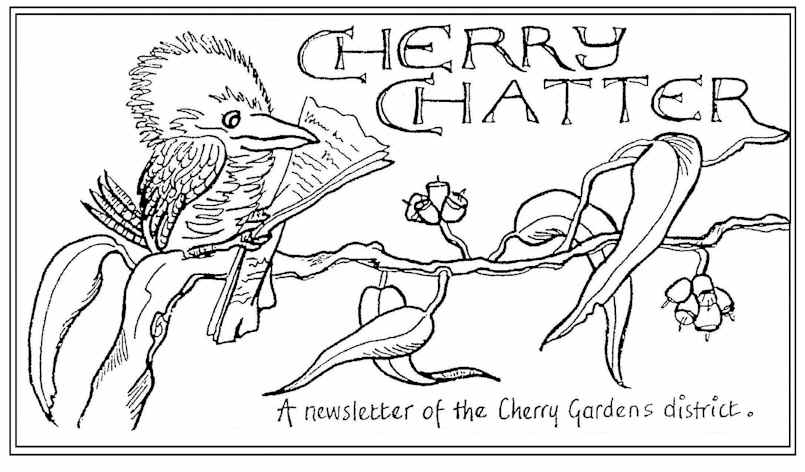The first stage of contractor work in the part of the park burnt in the Cherry Gardens fire earlier this year has been completed, thanks to Federal funding as part of a Bassian Thrush Threat Abatement Project.
Read MoreSince gaining permission from the National Parks and Wildlife Service SA to enter and conduct regular activities in the burn area, we have run our first bird banding and a couple of bushcare activities. There are still hazards present following the fire, but we have been given some additional protocols to keep us safe.
Read MoreThe University of Adelaide’s BandiBunch have completed their first series of mammal trap surveys in the fire scar and, in addition to the Bush Rats and Yellow-footed Antechinus that they found and I reported on in last month’s Cherry Chatter, they were very excited to find a male Southern Brown Bandicoot.
Read MoreSince the January fires that were deliberately lit around the local area, and which burnt out the eastern 500 hectares of Scott Creek CP, there has been much activity, mostly behind the scenes, planning for the recovery task ahead of us in the Friends group. While the bushland will recover, there are a number of weeds that will benefit from the fire and compete with the regenerating native plants.
Read MoreOn 24 January a deliberately lit fire on a high fire danger day burnt its way through 500 hectares of Scott Creek Conservation Park. So goes the impassive headline. A devastating heart-wrench for the Friends group was learning that the home of inaugural members Donna and Don Reid was also destroyed along with Donna’s amazing artworks and years and years of Don’s personal bird observation records.
Read MoreContinuing our group’s 30th anniversary celebrations, we will be running our annual Almanda Open Day on Sunday 15th November, followed by our AGM on Tuesday 17th. + November 2020 program, and general info about the Friends of Scott Creek Conservation Park.
Read MoreSeptember 2020 program + general info about the Friends of Scott Creek Conservation Park
Read MoreAs COVID-19 restrictions continue to ease, our activities are almost back to pre-coronavirus levels, though we continue to maintain protocols regarding social distancing, hygiene and asking that people who are feeling ill stay away until they are better.
Read MoreWith so much of Australia impacted by fires, then storms and flooding in some locations, it seems like a lot has happened since the last Cherry Chatter went out. Our thoughts are with all those who have lost loved ones, homes and livelihoods. There has been an enormous impact on communities, wildlife and the environment. All group activities are cancelled until further notice due to the current COVID-19 restrictions.
Read MoreAnyone wanting more information about the Friends of Scott Creek CP, or wanting to get involved, can contact us. All working bees during summer meet at the earlier time of 8.30am at the Almanda Car Park on Dorset Vale Road (unless there is a MLR fire ban or very wet weather).
Read MoreOn a Sunday in the middle of October we held our fourth Almanda Open Day at the Almanda Mine area of the park. For the first time this was held in spring, to better show off the park’s beautiful wildflowers. Anyone wanting more information about the Friends of Scott Creek CP, or wanting to get involved, can contact us.
Read MoreCome along to our Annual General Meeting at 7.30pm on Tuesday 12th November, to be held at the Cherry Gardens CFS station at 294 Cherry Gardens Road. The brief formalities will be followed by a presentation by Peter Hunt, asking us ‘would you recognise a native South Australian land snail if you saw one?’
Read MoreAre you interested in nature? Native plants? Wildlife? Looking for a break from the hustle and bustle? Want to give something back to the community or Mother Nature? We invite you all to come along to our open day on Sunday 13th October, between 10am and 3pm behind the Almanda mine car park on Dorset Vale Road.
Read MoreAre you interested in nature? Native plants? Wildlife? Looking for a break from the hustle and bustle? Want to give something back to the community or Mother Nature? We welcome anyone who wants to come along and see what we do at any of our activities.
Read MoreAre you interested in nature? Native plants? Wildlife? Looking for a break from the hustle and bustle? Want to give something back to the community or Mother Nature? We welcome anyone who wants to come along and see what we do at any of our activities.
Read MoreI have noticed quite a number of dying Messmate Stringybark (Eucalyptus obliqua) in the Mount Lofty Ranges, including in Scott Creek CP. There have also been a few deaths of quite old Silver Banksia (Banksia marginata), which is the only locally indigenous species of banksia we have in the Adelaide Hills. It is possible that other factors are also at play, in particular the root-rot disease Phytophthora cinnamomi (Pc).
Read MoreIt was great to finally get some steady rain early in May, let’s hope we return to something more like average or above average rainfall for the rest of the year. The good news is that our native vegetation is very resilient and, while it will certainly be impacted by long-term climate change, it will generally recover well from summer droughts.
Read MoreAre you interested in nature? Native plants? Wildlife? Looking for a break from the hustle and bustle? Want to give something back to the community or Mother Nature? We welcome anyone who wants to come along and see what we do at any of our activities.
Read More

















